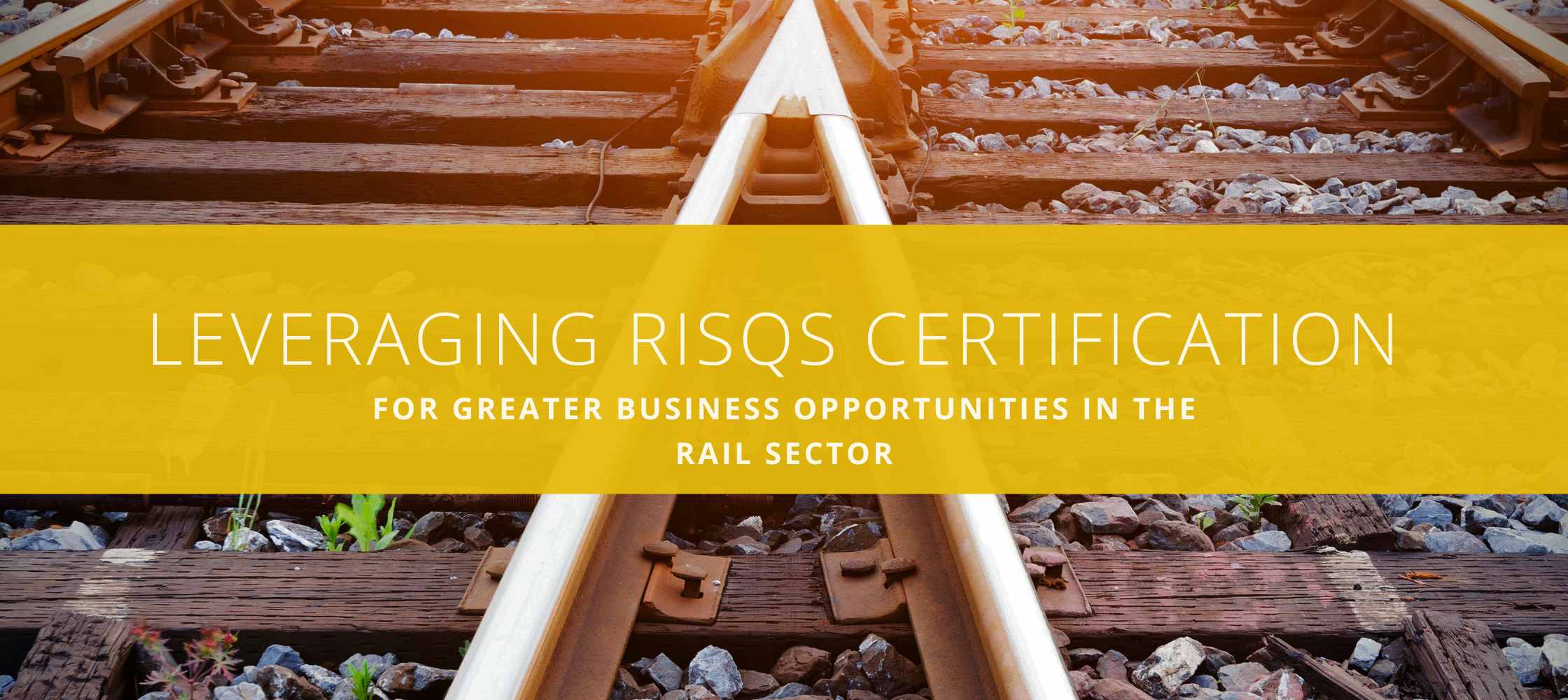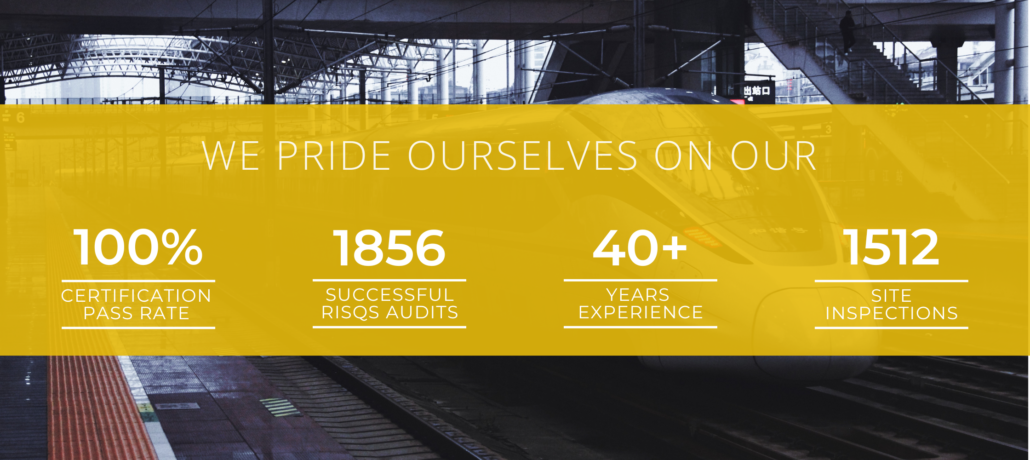Leveraging RISQS Certification for Greater Business Opportunities in the Rail Sector
Introduction
Achieving RISQS (Railway Industry Supplier Qualification Scheme) certification is more than just a compliance milestone; it is a strategic asset that opens the door to significant business opportunities in the rail sector. This certification serves as a testament to a company’s commitment to safety, quality, and reliability, making it a critical requirement for suppliers and service providers within the rail industry. This article explores how businesses can leverage RISQS certification to unlock a plethora of opportunities across various supplier categories within the rail sector.
The Value and Size of the UK Rail Industry:
The UK rail industry is a substantial economic sector, with an expenditure of £25.4 billion in the latest year. It supports approximately 710,000 jobs and generates £43 billion in GVA (Gross Value Added) to the economy. For every £1 spent in rail, £2.50 of income is generated in the wider economy, highlighting its significant multiplier effect. The rail sector plays a vital role in the UK’s infrastructure and is pivotal in post-pandemic economic recovery efforts, making it an attractive industry for businesses to access and thrive within.
The Role of RISQS Certification in the UK Rail Industry:
RISQS certification acts as a benchmark for safety, quality, and reliability in the rail industry. It assures clients that a certified supplier adheres to the stringent standards required for safe and efficient rail operations. The key benefits of being RISQS certified include enhanced credibility, increased marketability, and access to a broader range of projects and contracts. By obtaining this certification, businesses can demonstrate their commitment to meeting high standards and gain a competitive edge in the industry.
Unlocking Opportunities in Various Supplier Categories:
- Engineering and Construction Services: Engineering and construction firms play a vital role in the development and maintenance of rail infrastructure. RISQS certification is often a prerequisite for bidding on significant projects such as rail track maintenance, station construction, and infrastructure upgrades. This certification enables companies to demonstrate their capability to meet high standards of quality and safety, thereby securing more substantial and lucrative contracts within the rail sector.
- Consultancy and Project Management: The rail industry continuously seeks expert consultants and project managers to oversee complex projects and ensure compliance with industry regulations. RISQS-certified consultants are highly sought after for services such as safety audits, compliance assessments, and project planning. Having RISQS certification highlights a consultancy firm’s expertise and commitment to maintaining industry standards, thus expanding their client base and project opportunities.
- Safety and Environmental Services: Safety and environmental compliance are critical components of rail operations. RISQS certification validates a company’s ability to provide essential services such as environmental impact assessments, safety training, and hazard management. This certification ensures that service providers can conduct safety audits and training programs, promoting safety and sustainability in rail projects and thereby gaining more contracts.
- Electrical and Signalling Services: Electrical and signalling work are crucial for the operation of rail systems. RISQS certification enables electrical engineers and signalling experts to access projects that require specialised skills and adherence to rigorous safety standards. This certification is essential for companies involved in the installation and maintenance of signalling systems, ensuring reliable and safe rail operations.
- Maintenance and Repair Services: The rail industry has an ongoing need for maintenance and repair services to ensure the longevity and safety of rail infrastructure and rolling stock. RISQS certification is essential for businesses offering services such as rolling stock maintenance and infrastructure repair. Certified maintenance firms can secure long-term contracts for regular maintenance work, demonstrating their reliability and adherence to safety standards.
- Technology and Innovation: The integration of advanced technology is transforming the rail industry. Companies providing innovative solutions, such as digital signalling systems and predictive maintenance software, can significantly benefit from RISQS certification. This certification helps tech firms introduce cutting-edge technologies that enhance operational efficiency and safety, positioning themselves as leaders in rail technology solutions.
- Recruitment Services: Recruitment companies play a crucial role in supplying skilled personnel to the rail industry. RISQS certification is mandatory for these companies to ensure they meet the stringent safety and competence standards required by the rail sector. This certification enables recruitment firms to provide highly qualified candidates for various roles, from engineers to safety officers. Being RISQS-certified not only expands their market but also assures clients of the quality and reliability of the workforce provided.
Examples of Unusual Contractors in the Rail Industry:
While the rail industry heavily relies on traditional contractors, it also employs a range of more unusual suppliers:
- Drone Operators: Used for infrastructure inspections and maintenance.
- Environmental Scientists: Conducting impact studies and sustainability projects.
- Digital Security Firms: Implementing cybersecurity measures for rail networks.
- Catering and Hospitality Providers: Serving on long-distance and luxury trains.
The Robustness and Security of the Rail Industry:
The rail industry is known for its stability and reliability as a backbone of national infrastructure. Ongoing government investments and long-term projects like HS2 ensure continued growth and opportunities. The sector’s role in providing sustainable and green transport solutions aligns with broader environmental goals, making it a robust and secure industry for businesses to engage with.
The Impact of RISQS Certification on Business Growth:
RISQS certification significantly enhances a company’s credibility and trust within the rail industry. This certification acts as a stamp of approval, assuring clients and partners of a company’s commitment to safety and quality. Certified businesses enjoy increased marketability and a competitive edge, enabling them to secure more contracts and expand their operations. The certification helps companies build strong reputations and gain a foothold in new markets, driving substantial business growth.
Steps to Leverage RISQS Certification:
- Marketing Your Certification: Highlight RISQS certification in marketing materials to emphasise your compliance and reliability.
- Networking Within the Industry: Attend industry events to connect with potential clients and partners.
- Maintaining Compliance: Regularly review and update compliance processes to ensure adherence to RISQS standards.
Conclusion:
RISQS certification is a powerful tool for unlocking business opportunities in the rail sector. By demonstrating a commitment to safety, quality, and reliability, businesses can leverage their certification to secure contracts, expand their market presence, and drive growth. For those seeking to maximise the benefits of RISQS certification, Simpson Consultancy offers expert guidance and support to help you navigate the certification process and achieve long-term success in the rail industry.
Contact us today to learn more about how we can assist you in leveraging RISQS certification for greater business opportunities.







